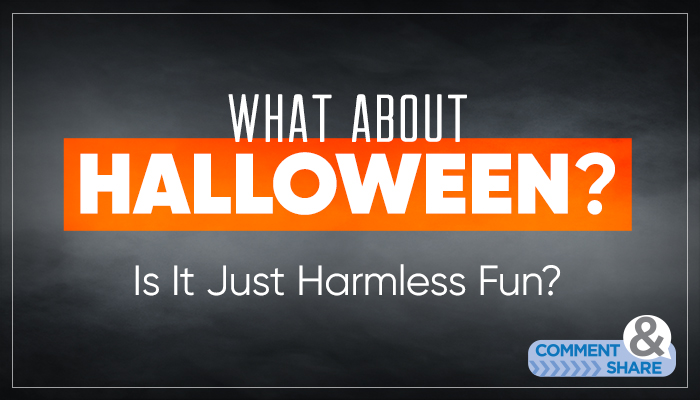Each year during Halloween, parents are faced with the dilemma of whether or not they should let their children participate in what is culturally seen as “harmless fun.” Just like everything else, it’s important that we all seek God concerning these decisions. The following history of Halloween might be helpful to your family as you seek wisdom. The Tradition of Trick Or Treat
Many Halloween traditions stem from Irish, Scottish and British folk customs—the most notable of which is the Gaelic autumn festival of “Samhain.” This festival was celebrated from sunset on October 31 through sunset on November 1. It was believed that during these hours, the souls of the dead (or ghosts) would roam the earth and revisit their homes. The people would welcome these spirits by offering feasts of food and drink. As part of the festival, people would go door-to-door wearing costumes imitating roaming spirits. These people would recite verses and say prayers for the dead in exchange for food. Various acts of mischief and the playing of pranks were also common. It’s no doubt that the modern day practice of “trick or treating” comes from these traditions. Samhain was and continues to be significant to various groups of witches and wiccans. Divination and necromancy were thought to be especially effective during Samhain and, according to folklore, witches could be seen flying through the air on broomsticks, ravens or black cats. During Samhain huge bonfires were built on hilltops and were used in various rituals. These rituals were seen to have protective and cleansing powers and sometimes even included crop offerings and animal sacrifices.The Tradition of the Jack-O-Lantern The jack-o’-lantern was part of a similar tradition—people hollowed out gourds and turnips (and later pumpkins in the United States),and carved a face on them. Then, they lit a candle inside to scare evil spirits away.
Why the name “Jack”? The “Jack” comes from an Irish folk tale from the mid-19th Century. According to the tale, a damned soul named “Jack” was not allowed into heaven or hell, so he wandered around in the darkness. The carved turnip, gourd or pumpkin symbolized Jack. Samhain became “Christianized” through the feast of All Hallows’ Eve, which is the evening before All Saints’ Day. The Romans, who conquered the Celts around A.D. 43, also wanted to honor the newly overpowered descendents of the Druids in Germany and Scandinavia, so All Saints’ Day and Samhain became unified with the same focus of reverencing the dead. The combination of these customs has developed into the traditional celebration we call Halloween.Alternative Options for Christians
So, what about Halloween? Even though it can seem harmless, it does have dark pagan roots, and as believers, we should never celebrate fear and terror. What options do believers have during this time of year? Here are several ways some respond to Halloween:- Some Christians choose not to participate in any special activities during Halloween. They use this as an opportunity to teach their children that the Lord may sometimes ask them to not participate in certain activities, even though “everyone else” is doing it, and there may not always be an alternate activity.
- Many churches offer fall festivals, with fun and games. Most of the time, these festivals have nothing to do with the traditions of Halloween, and they are usually held in the fall and around the same time. The fall harvest is a beautiful time of year that is great for celebrating God’s provision.
- Other churches choose to host alternative events on Halloween because they have found great success in offering clean, fun activities to their communities and have won many to Christ through these outreaches. Some children may show up in “scary” costumes since these events are often held on Halloween. We should always show the love of Jesus to people—no matter what they’re wearing.
